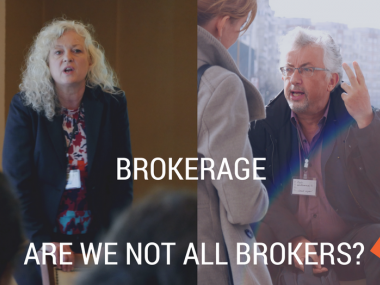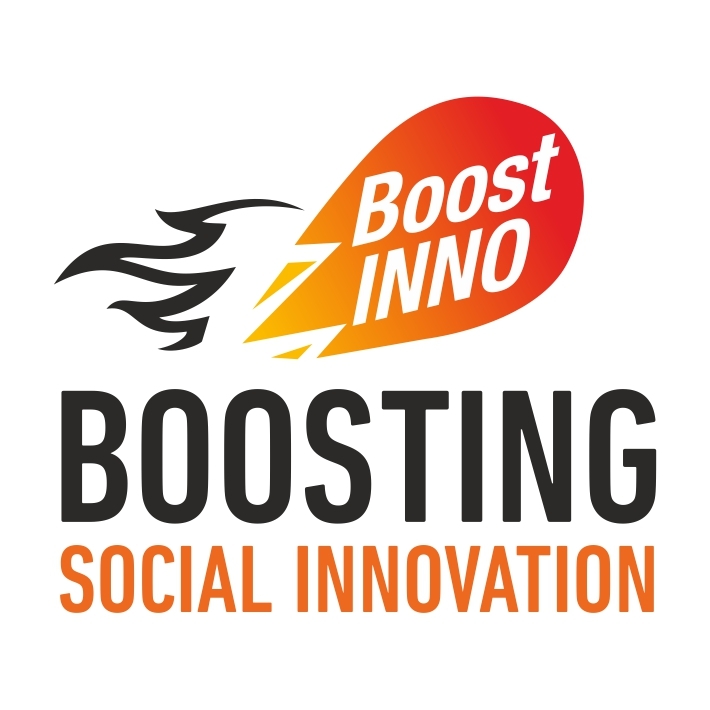Brokerage: Are we not all brokers?
Edited on
31 October 2017What qualities should a broker have? The answers to these questions can be found in the talk that took place during the BoostINNO Network Meeting in Baia Mare. It was attended by Piotr Wolkowinski, Lead Expert of BoostINNO and Erna Bosschart Co-founder of the SIAC network.

Peter Wolkowinski: Erna you are talking earlier about connection. Are you saying we are not connected as people at the moment?
Erna Bosschart: Yes, sometimes I feel we have the tendency to think as a group. Of course, that kind of thinking is making you safe and acknowledge. But take an example. The current financial situation in many of our societies is not so good, many people are not able to have good houses, food or education. We tend to fight with other groups in our society to reclaim these goods. So, yes I would say we should pay more attention to staying connected at the human level, instead of the group level.
PW: I have an opinion that a broker is somebody who is 360 degrees, all around the circle. Did you agree that a broker has to deal with everything? With himself, with other people, with institutions, with time? How do you see a broker?
EB: The personality of a broker is an instrument and in my opinion a broker should be able to collect real questions or find out what the real questions are from the person or entity that he wants to know. To know is a key. When he collects these questions he must share with other people or entities which are able to find the solution.
PW: I was in a meeting with a 150 schools directors in Gdansk recently, where I was trying to analyse whether each of the directors is a broker? Is the director of the department of education is a broker? Is the city is a broker? Because all three levels have different roles. How would you react to this?
EB: I would say yes. If they have broker elements, they will be better in their role. Because you can not find the best solution alone. So yes, they all should have broker image.
PW: You define two important elements: connecting and knowledge transition. Is there another element which is absolutely crucial to be a broker? Because when we go into the top level of city management how can I be a broker, when I am a director of a department?
EB: First you should learn to listen and ask the right questions. I think it is also depending on your personality. If you think that what do you say is a gold egg, that you always have “the truth”, you will be a lousy broker. But if you are ready to point the right questions and you go to talk to the people which you want to work with it is a far better path. Piotr, you are a perfect example of a really good broker. Do you agree?
PW: I do not know. In my life, I found myself in many places where I have been very much an “in-between person”. So either on the city level or NGO level or social economy level, I am always in-between. I am trying to make things connect, work, to improve people's knowledge, all the things you are saying. I also think we have to teach people to understand things. You have to organise it in the right way. I am a kind of translator, I translate one reality to another reality.
EW: You say something very interesting. You say I was in-between. I was neither part of the city, I was neither part of a research institute, I was in-between. You think it is a condition to be a broker?
PW: You have to understand that you are not the one person who has a gold egg. There are plenty of gold eggs and we have to make an omelette out of this. How do you produce this omelette? Everybody has to break their eggs. This is an element, suddenly people find out, they do not have the only reason why. For example, in Gdansk directors of the social department are doing a mapping of the crucial needs of the city and they are making that coherent with the social responses that they already have.
For example, let's take one school. What competence do I have to solve the problems of this school but which are not in my department? This is a kind of logic when some other directors are coming to see this director and say “You know what happens in this area. You create a new street, path and roads. Tell me what the situation is and we can help it.” They go further than that, now they have another broker. The idea of a brokerage is a never ending chain. The brokers are the people who are working together and understanding that we can not rule the city we have to co-construct the city. It is not easy at all. Some people are worried because of their authority/responsability. They ask: Is it my domain? Can I rule in this area? And that is a big problem.
We have two levels of government. We have a vertical government: Europe, the government, the region, the city, me and we have a horizontal government: electricity, gas, water, safety, roads, economy. We have a group of brokers who mix between the vertical and horizontal levels. I have to find the point where I can be in the middle. It is an obviously endless process.
EB: I want to add something to a “person to person level”. We are trained by our brain to choose a solution that we already knew. We have totally different vision on how things should be done.You need others inputs, perspectives to reach better results.
PW: I think the broker has to deal with no one answer. Very often we are confronted with several challenges and we have to find several answers in social innovations. But diverse thinking is very important in this because maybe there are six answers to the challenge, three of them are good and maybe one will be chosen but three should be not be forgotten. It is not so simple. We have to be open to a different solution, which means the things can not be zero-one: a migrant or not a migrant, enemy or a friend, it is not so simple. We have to be open to that.
I would like to finish with the thought that I think the broker space is networking. The networking is a creation of a logic between us, a connection and I think is it also a flow, a movement between people. I try to produce a little bit of flow during this meeting. We can carry this flow outside by telephone, e-mail, and meet again. Maybe that is the way we change the world.
 Submitted by BoostINNO on
Submitted by BoostINNO on
